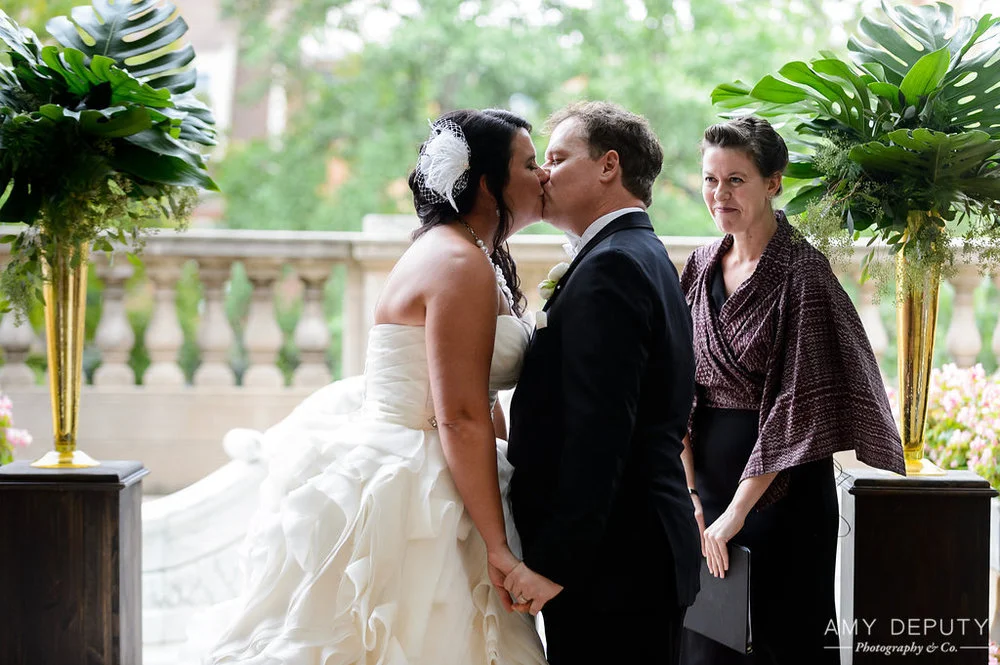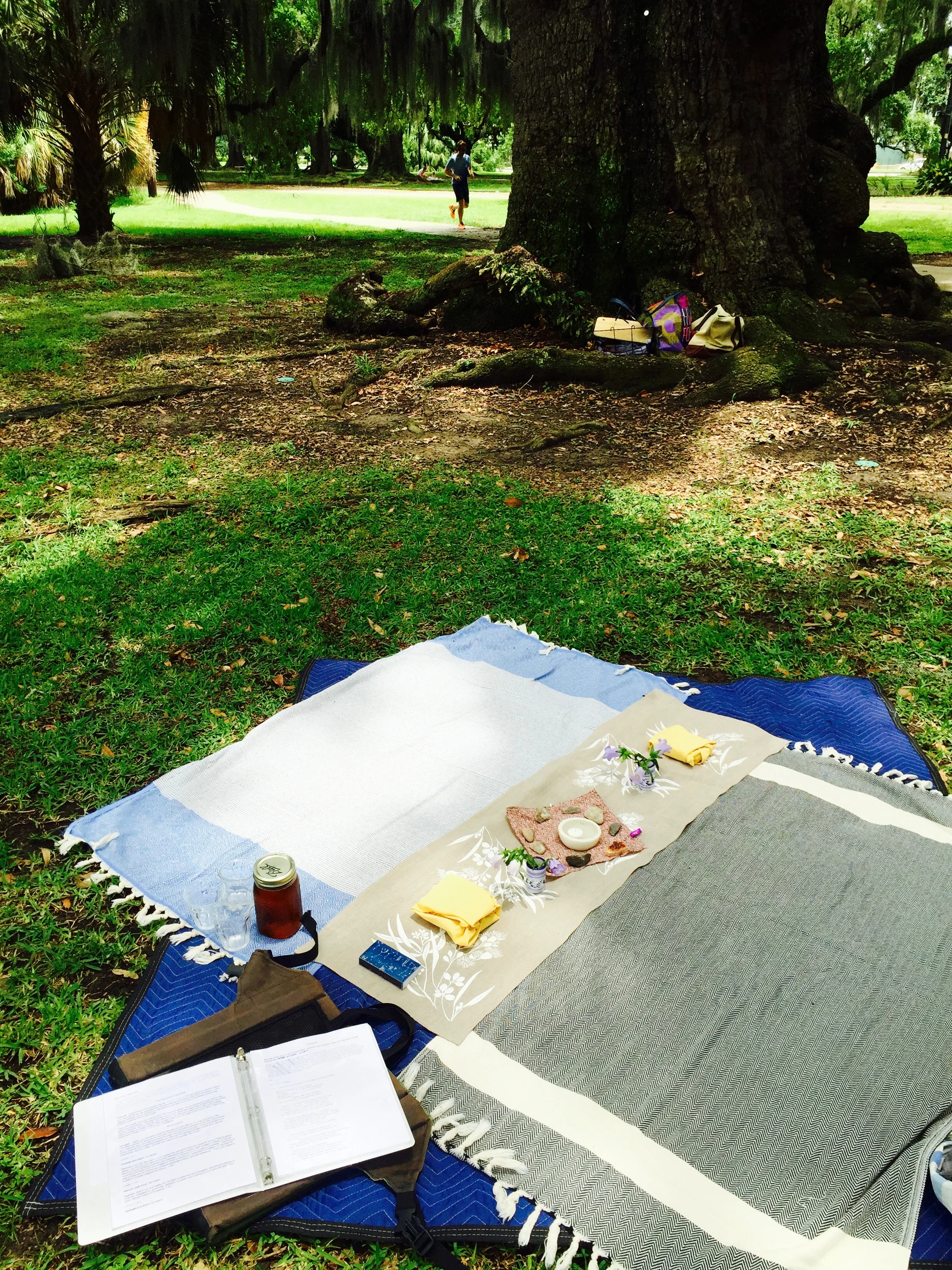The Pros and Cons of Asking a Friend to Officiate Your Wedding // River and Root
/Photo by Amy Deputy Photography
Hannah Nielsen-Jones, a Life-Cycle Celebrant and the founder of River and Root Ceremonies, discusses how secular and religiously unaffiliated couples can assemble the perfect team to create a meaningful and personal wedding ceremony.
It’s astonishing how quickly the wedding ceremony itself can recede into the background once wedding planning actually begins. You may have all of the best intentions of crafting a ceremony that truly reflects who you are, but in between meetings with vendors, sorting out a venue, and the other thousand-and-one decisions that can go into this major life milestone…it’s not unusual to find yourself a few weeks or months from the date, wondering how, actually, you and your partner are going to get married.
Ask A Friend // Pros
If you are not getting married in a traditional religious space with a traditional religious ceremony, one solution is asking a friend to officiate the wedding. There are many benefits to bringing a friend into this role. Ideally, this person knows you and your partner deeply, has been present for some of the peaks and valleys of your relationship already, and is stoked to be a part of this momentous occasion.
Ask A Friend // Cons
However, asking a friend to officiate also means asking them to write the ceremony. The pressure to write, edit, and lead such a powerful and important piece of your wedding celebration can be a lot.
Without the time or inclination to go down Internet rabbit holes and/or read the multiple well-written books on the subject, it can be daunting. Your friend may write something you don’t like (and/or have feelings if they work hard on something that you want them to change). If you all agree on a timeline to prepare the ceremony, your friend may not be able to meet those deadlines. Each of you is living your everyday life while trying to work on this wedding ceremony, which everyone wants to be special, while sharing who the two of you are as individuals and as partners, to a room full of people who know one or both of you in a wide variety of ways. It’s a tall order.
Photo by Amy Deputy Photography & Co.
Bring A Life-Cycle Celebrant Onto Your Team
The good news is that it is possible to take the pressure off of your friend to prepare a perfect ceremony for you, while still allowing them to lead the celebration and legally marry you and your partner. Life-Cycle Celebrants are trained ceremony and ritual professionals who can work with you and your officiating friend to create a ceremony that feels comfortable and meaningful to all of you. We are skilled and trained in blending and incorporating elements of different faith traditions and backgrounds into secular (but possibly spiritual) ceremonies.
As a Life-Cycle Celebrant who works with couples at all stages of the wedding ceremony writing process, I’m familiar with how overwhelming all of this can be. I love talking to people about ceremony possibilities and seeing what emerges from conversations! Some people I work with hire me to co-create, write, edit, and lead their wedding after an initial consultation, while some people hire me to write their ceremony with another person in mind to lead it, with whom I may also collaborate.
What exactly is a Life-Cycle Celebrant?
We work together to name and honor who and what you wish to be present in the space as you get married. Together, we identify elements that resonate with you. I use those elements to catalyze a ceremony that honors you and your partner and reflects your story. We develop a detailed plan with facets both abstract and specific, with language truly reflective of you and your partner.
If you just want to discuss your ideas with someone who is experienced in crafting ceremonies and celebrations, I offer two-hour wedding ceremony consulting packages to talk about the ideas and vision for a ceremony. After the conversation, I send over a curated list of three to five readings and a personalized ceremony outline. This can be a really good start and eliminate a lot of stress from the whole process, not to mention save you a bunch of time combing through your bookshelf for meaningful passages — because I already did that for you!
With that in mind, I’d like to offer you a starting point for a wedding scaffold structure. You and your friend can flesh this out, move things around, add or subtract, and edit it into something that feels right to you. Maybe you want to add a community vow or sing a song together. Maybe you are planning to have ring tattoos done a month before the wedding rather than exchanging rings. All of these are wonderful elements that will make your wedding ceremony a reflection of you and your partner and your loving community.
A Wedding Ceremony Scaffold
Entering the space (whether that’s a processional or not)
Welcoming everyone
A moment of remembrance for those who have passed away or could not otherwise be present
A reading
Remarks about the couple
Wedding vows
Ring exchange and/or another unity ritual
Another reading
Final remarks
Presentation of the couple (‘I now pronounce you …’)
Leaving the ceremony space
It is not at all uncommon that what is initially the focus of the whole kit and caboodle — the ceremony itself, the transformative moment when two individuals become a family unit — comes together with less care and attention to detail than other elements of the wedding. Often this is due to a shortage of time, but it doesn’t have to be that way. Someone needs to focus on the wedding ceremony, but it doesn't have to be you (at least, until you are actually up there getting married!). Bringing a Life-Cycle Celebrant onto your team for even a few hours will result in a ceremony that will ground the entire celebration and live in your memory for years to come.
Hannah es disponible para realizar ceremonias en Español tambien
Hannah Nielsen-Jones is a Life-Cycle Celebrant and the founder of River and Root Ceremonies, providing officiant services, ceremony co-creation, and consulting for people in the DC Metro area and beyond. She believes that we all deserve ceremonies congruent with who we are that authentically reflect our lives, our stories, and our hopes for future chapters we have yet to write.
























